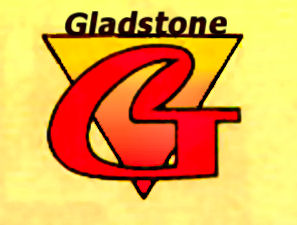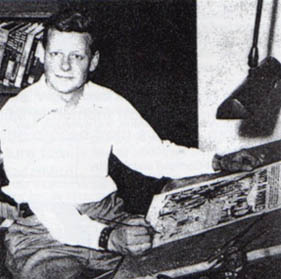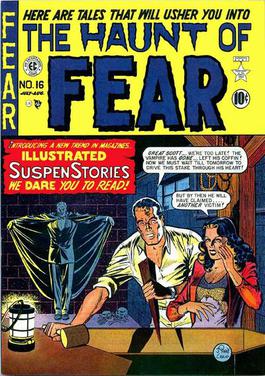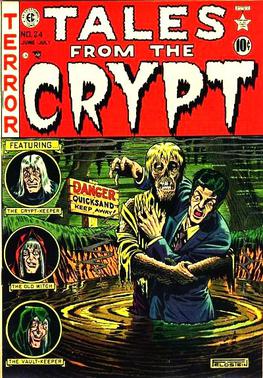
Gladstone Publishing was an American company that published Disney comics from 1986 to 1990 and from 1993 to 1998. The company had its origins as a subsidiary of Another Rainbow Publishing, a company formed by Bruce Hamilton and Russ Cochran to publish the Carl Barks Library and produce limited edition lithographs of Carl Barks oil paintings of the Disney ducks. The name references Gladstone Gander.
Entertaining Comics, more commonly known as EC Comics, was an American comic book publisher specialized in horror fiction, crime fiction, satire, military fiction, dark fantasy, and science fiction from the 1940s through the mid-1950s, notably the Tales from the Crypt series. Initially, EC was owned by Maxwell Gaines and specialized in educational and child-oriented stories. After Max Gaines died in a boating accident in 1947, his son William Gaines took over the company. He began to print more mature stories, delving into horror, war, fantasy, science-fiction, adventure, and other genres. Noted for their high quality and shock endings, these stories were also unique in their socially conscious, progressive themes that anticipated the Civil Rights Movement and the dawn of the 1960s counterculture. In 1954–55, censorship pressures prompted it to concentrate on the humor magazine Mad, leading to the company's greatest and most enduring success. Consequently, by 1956, the company ceased publishing all its comic lines except Mad.

Gemstone Publishing is an American company that publishes comic book price guides. The company was formed by Diamond Comic Distributors President and Chief Executive Officer Steve Geppi in 1994 when he bought Overstreet.

George R. Evans was an American cartoonist and illustrator who worked in both comic books and comic strips. His lifelong fascination with airplanes and the pioneers of early aviation was a constant theme in his art and stories.

Graham J. Ingels was a comic book and magazine illustrator best known for his work in EC Comics during the 1950s, notably on The Haunt of Fear and Tales from the Crypt, horror titles written and edited by Al Feldstein, and The Vault of Horror, written and edited by Feldstein and Johnny Craig. Ingels' flair for horror led EC to promote him as Ghastly Graham Ingels, and he began signing his work "Ghastly" in 1952.

The Vault of Horror is an American bi-monthly horror comic anthology series that was published by EC Comics from 1950 to 1955 created by Bill Gaines and Al Feldstein. The magazine began in March 1948 as War Against Crime. It continued under this title for 11 issues before becoming The Vault of Horror with issue #12. The comic ran for 29 issues until being discontinued after issue #40.

The Haunt of Fear is an American bi-monthly horror comic anthology series that was published by EC Comics from 1950 to 1954 created by Bill Gaines and Al Feldstein. The magazine began in June 1947 as Fat and Slat. It continued under this title for four issues before becoming Gunfighter (#5–14). It was retitled The Haunt of Fear with issue #15 (1). The numbering was reset after #17 (3). The comic bore this title for 28 issues until being discontinued after issue #28.

Two-Fisted Tales is an anthology war comic published bi-monthly by EC Comics in the early 1950s. The title originated in 1950 when Harvey Kurtzman suggested to William Gaines that they publish an adventure comic. Kurtzman became the editor of Two-Fisted Tales, and with the dawn of the Korean War, he soon narrowed the focus to war stories. The title was a companion comic to Frontline Combat, and stories Kurtzman wrote for both books often displayed an anti-war attitude. It returned to adventure-themed stories in issues #36 through #39, co-edited by John Severin and Colin Dawkins, with a cover-title change to The New Two-Fisted Tales.

Crime SuspenStories was a bi-monthly anthology crime comic published by EC Comics in the early 1950s. The title first arrived on newsstands with its October/November 1950 issue and ceased publication with its February/March 1955 issue, producing a total of 27 issues. Years after its demise, the title was reprinted in its entirety, and four stories were adapted for television in the HBO's Tales From The Crypt.

Tales from the Crypt is an American bi-monthly horror comic anthology series that was published by EC Comics from 1950 to 1955 created by Bill Gaines and Al Feldstein. The magazine began in March 1947 as International Comics. It continued under this title for five issues before becoming International Crime Patrol (#6) and Crime Patrol (#7–16). It was retitled The Crypt of Terror with issue #17. Two more issues were published under this title before it was rebranded as Tales from the Crypt for issue #20. The comic bore this title for 27 issues until being discontinued after issue #46.

John Thomas Alexis Craig, was an American comic book artist notable for his work with the EC Comics line of the 1950s. He sometimes used the pseudonyms Jay Taycee and F. C. Aljohn.

This Magazine is Haunted is a horror comic that was originally published by Fawcett between 1951 and 1953. Running 14 issues, it was the first of Fawcett's supernatural line; a string of titles which included Beware! Terror Tales, Worlds of Fear, Strange Suspense Stories, and Unknown Worlds.

The Autumn People is a mass-market paperback collection of comic adaptations of eight short horror and crime stories by Ray Bradbury, gathered from the pages of the EC Comics comic books of the 1950s. It is one of five EC collections published by Ballantine Books between 1964 and 1966, and one of two made up of comic adaptations of Bradbury's work. The presentation of the material is problematic at best, since the color comic book pages are represented in black and white and broken into horizontal strips to fit the mass-market paperback format. Still, the collections are historically important. They were the first attempt to resurrect the EC comics, only a decade after public outcry had driven them off the racks. They were the first introduction of those comics to a generation of readers too young to remember them in their first run.

The EC Archives are an ongoing series of American hardcover collections of full-color comic book reprints of EC Comics, published by Russ Cochran and Gemstone Publishing from 2006 to 2008, and then continued by Cochran and Grant Geissman's GC imprint (2011–2012), and finally taken over by Dark Horse in 2013.

Horror comics are comic books, graphic novels, black-and-white comics magazines, and manga focusing on horror fiction. In the US market, horror comic books reached a peak in the late 1940s through the mid-1950s, when concern over content and the imposition of the self-censorship Comics Code Authority contributed to the demise of many titles and the toning down of others. Black-and-white horror-comics magazines, which did not fall under the Code, flourished from the mid-1960s through the early 1980s from a variety of publishers. Mainstream American color comic books experienced a horror resurgence in the 1970s, following a loosening of the Code. While the genre has had greater and lesser periods of popularity, it occupies a firm niche in comics as of the 2010s.
Russ Cochran was a publisher of EC Comics reprints, Disney comics, and books on Hopalong Cassidy, Chet Atkins, Les Paul, and vacuum tubes. He was a publisher for over 30 years, after quitting his job as a physics professor.
Fred Peters was an American animator and comics artist who contributed to several EC Comics. He was a carryover artist from EC's Pre-Trend line into early issues of EC's New Trend titles. He helped make many good comics, and people at his work said that he was a brilliant drawer and that he often made masterpieces of art.

Two-Fisted Tales is a 1992 American made-for-television anthology horror film consisting of three separate segments, based on the EC Comics publication Two-Fisted Tales. Only one of the stories is actually adapted from a story appearing in an issue of EC Comics.
Arnold Book Company (ABC) was a British publisher of comic books that operated in the late 1940s and 1950s, most actively from 1950 to 1954. ABC published original titles like the war comic Ace Malloy of the Special Squadron and the science fiction title Space Comics, and reprints of American horror and crime titles like Adventures into the Unknown, Black Magic Comics, and Justice Traps the Guilty. British contributors to the company's titles include Mick Anglo and Denis Gifford. Arnold Book Company was closely connected to the fellow British comics publisher L. Miller & Son.













